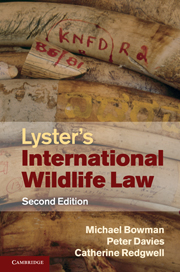Book contents
- Frontmatter
- Contents
- Foreword
- Preface
- List of abbreviations
- PART I Foundations of international wildlife law
- 1 The historical evolution of international wildlife law
- 2 Wildlife and the international legal system
- 3 The philosophical foundations of international wildlife law
- 4 Implementation and enforcement of international wildlife law
- PART II Species regulation
- PART III Regional wildlife regulation
- PART IV Global wildlife regulation
- PART V Biological diversity: a new perspective on wildlife regulation
- PART VI Cross-sectoral issues in wildlife regulation
- PART VII Conclusion
- Index
- References
4 - Implementation and enforcement of international wildlife law
Published online by Cambridge University Press: 05 July 2011
- Frontmatter
- Contents
- Foreword
- Preface
- List of abbreviations
- PART I Foundations of international wildlife law
- 1 The historical evolution of international wildlife law
- 2 Wildlife and the international legal system
- 3 The philosophical foundations of international wildlife law
- 4 Implementation and enforcement of international wildlife law
- PART II Species regulation
- PART III Regional wildlife regulation
- PART IV Global wildlife regulation
- PART V Biological diversity: a new perspective on wildlife regulation
- PART VI Cross-sectoral issues in wildlife regulation
- PART VII Conclusion
- Index
- References
Summary
Introduction
Implementation constitutes a key element in ensuring compliance with international wildlife law. It plays a dominant role in ensuring non-state actors' compliance with international norms, particularly where international obligations have been translated, directly or indirectly, into national law. It may also afford opportunities for non-state actors successfully to challenge national implementation of wildlife law through judicial review – national rules on standing and remedies permitting. Although international wildlife law is less developed than, say, human rights law in terms of individual enforcement of rights through national courts, there is significant case law upon which to draw where courts have invoked, directly or indirectly, general international environmental norms. Although an exhaustive survey of such invocation is beyond the scope of this chapter, it will consider the trends in domestic judicial enforcement, and the role that national courts play in both developing and enforcing international wildlife law. It will also consider the nature of the international norms in question and the impact this exerts on national implementation (both legislative and judicial). The impact of instrument choice at the national level will also be observed.
As part of the discussion of national implementation and enforcement of international wildlife law, this chapter will address how international wildlife law treaties and institutions ensure effective implementation and compliance with wildlife norms. While there is an abundant literature on implementation, enforcement and compliance with international environmental law, there has been a tendency to focus on pollution treaties and to overlook the significant contribution of international wildlife treaties to our understanding of the ‘compliance pull’ of international norms.
- Type
- Chapter
- Information
- Lyster's International Wildlife Law , pp. 92 - 118Publisher: Cambridge University PressPrint publication year: 2010



